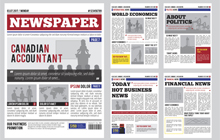Sunday News Roundup 22.11.27: Accounting exams, IFRS 8 greedflation, and more Canadian accounting news

Wrapping up the odds and ends from the past week in Canadian accounting news
Subscribe to our weekly newsletter and get all the week’s stories. Click here to sign up.
TORONTO, Nov. 27, 2022 – The headline news of the past week in Canadian accounting was the publication of the exam results from the September Common Final Examination. Over four thousand students passed the national exam and are now on their way to becoming chartered professional accountants. The exam had none of the drama associated with the CFEs of the past few years, from technical failures to pandemic planning, although some students did complain that provincial results platforms were slow to load due to busy servers.
The concept of accounting exams has been under some scrutiny recently due to a shortage of accountants in other countries, specifically the US and UK. For example, Fortune Magazine reported that the uniformity of the CPA exam in the US, is one reason why the MBA is the “go-to degree.” The Financial Times recently reported that, “Faced with a sharp decline in the number of people taking exams for entry to the profession, and a slide in interest in university accounting courses that hints at deeper trouble to come, the industry is trying to reverse the trend.”
While the exam is seen as one of several barriers to the profession that are contributing to the shortage, the reasons for a shortage of accountants has been debated. The Business Times in the UK recently reported that the Big Four firms have launched a global hiring spree due to business demand. But “another part of the answer is a post-Covid staff exodus.” And now, on to more news from the past week in Canadian accounting.
How IFRS camouflages the conglomerate profits of grocery monopolies
Early in November, we reported on the work of Samantha Taylor, a senior instructor of accounting at Dalhousie's Rowe School of Business, who explained why it “it is impossible to tell whether a company like Loblaw, which sells clothing lines (Joe Fresh) and pharmaceuticals (Shoppers Drug Mart) within some of its grocery stores, is profiting from grocery sales growth.” (Hint: It’s all about Internal Financial Reporting Standards.)
This past week, David Milstead at the Globe and Mail took up the issue, explaining to readers why IFRS 8 (Operating Segments) allow conglomerates like Loblaw to “muddy the waters” and make it dificult to accurately accuse a company of “greedflation.” Milstead is one of the few Canadian reporters that is willing to do the heavy lifting on accounting standards in his articles.
Feds impose carbon pricing on Maritimes amidst “theatre and drama”
The most controversial Canadian tax of the 21st century has been imposed on the Maritime provinces of Nova Scotia, Prince Edward Island, and Newfoundland and Labrador, after their own proposals were deemed to have “fallen short of the federal benchmark for emissions reductions,” said the CBC this past week. After the feds accepted Saskatchewan’s plan earlier this week, it means that most of Canada, including its largest provinces, all run provincial plans, while Manitoba and the Maritimes wll run the federal system.
Environment and Climate Change Minister Steven Guilbeault couldn’t help but call out Nova Scotia Premier Tim Houston for a level of "theatre and drama" unseen in other provinces, including Alberta. The National Observer reported that Politics remain heated around carbon tax for Atlantic Canada. Nova Scotia Premier Tim Houston has long been a vocal opponent of the tax in a province where at least one coal mine is reopening to cash in one higher commodity prices. The carbon tax will not take effect until next Canada Day.
Accounting Dealbook: MNP scores again in Quebec
Homegrown accounting firm MNP continues to expand its footprint in Quebec. This past week it picked up Malenfant Dallaire S.E.N.C.R.L., headquartered in Quebec City, to add to its 26 offices. To get a sense of the size of the acquisition, recall that PwC Saskatchewan, which was recently acquired by BDO Canada, has three partners and 40 CPAs. The team at Malenfant Dallaire has nine partners and 30 team members.
Quick Hits: Articles of Interest
Canadian
The details of the Laurentian University bankruptcy story are damning. Will they lead to change? (TVO Today)
Eby announces dedicated B.C. housing ministry, as Opposition seeks audit of providers (Canadian Press)
B.C. auditor highlights costs of 2021 disasters, pandemic relief payments (Pattison Media)
Manitoba municipality loses half a million dollars in alleged e-transfer fraud (CBC)
CBA head calls for 'more carrot, less stick' when it comes to tax policy on banks (Financial Post)
Danielle Smith makes clean break with Jason Kenney era, at cost of Heritage Savings Trust Fund infusion (Globe and Mail)
B.C. used car buyers furious over provincial tax changes that have them paying more (CBC)
The CRA is already challenging real estate transactions ahead of new anti-flipping rules (Financial Post)
International
The PCAOB Is Missing In Action on Climate Risk (Harvard Law School Forum on Corporate Governance)
First Accounting Firm With HQ in Metaverse Is Sued Over FTX Meltdown (Bloomberg Tax)
The PCAOB Thinks It Deserves a 12.6% Raise (Going Concern)
By Canadian Accountant staff.








(0) Comments